|
|
|
Sort Order |
|
|
|
Items / Page
|
|
|
|
|
|
|
| Srl | Item |
| 1 |
ID:
138770
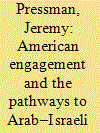

|
|
|
|
|
| Summary/Abstract |
This close empirical study of decades of US efforts to bring peace between Arab states and Israel helps reflect on Arild Underdal and Oran R. Young’s leadership typologies. Distinguishing between coercive leadership based on the incentives and sanctions that robust capabilities make possible and instrumental leadership focused more on talking, skilled mediation, and policy innovation is useful. However, this US mediation demonstrates that the two are not wholly distinct as previously suggested. The narrative of US efforts from Richard M Nixon to William J Clinton, including 22 cases of US involvement in Arab–Israeli mediation, suggests successful US mediation has been based on four factors. US involvement has led to breakthroughs when the US administration was highly engaged and kept at the problem after an initial diplomatic setback; benefitted from an exogenous event; managed that event to the US advantage; and dealt with strong Arab and Israeli partners.
|
|
|
|
|
|
|
|
|
|
|
|
|
|
|
|
| 2 |
ID:
084003
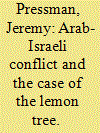

|
|
|
|
|
| Publication |
2008.
|
| Summary/Abstract |
This article uses the The Lemon Tree by Sandy Tolan (2006) to demonstrate how one type of book, a literary non-fiction book written for popular audiences, can be used in a political science course such as one on the Arab-Israeli conflict. The book concisely presents multiple Arab-Israeli perspectives and enlivens the history and infuses it with both broader and deeper meaning. After a brief summary of the plot, the article gives examples of political science themes for which the book is a useful text: nationalism and the formation of national identity; the relationship between structure and agency; and the search for objective truth. The book also suggests many broad Arab-Israeli motifs. The article explains how the book was used in the classroom, including discussions, guidance sheets, and a longer paper assignment.
|
|
|
|
|
|
|
|
|
|
|
|
|
|
|
|
| 3 |
ID:
188636
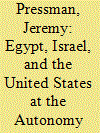

|
|
|
|
|
| Summary/Abstract |
Most scholars writing on Arab-Israeli matters barely address the Egyptian-Israeli autonomy talks, and what has been written largely dismisses them as Egyptian and United States capitulation to Israeli expansion. But a focus on archival documents from the first months of the talks in 1979 demonstrates three points at odds with this conventional narrative. Whilst Egyptian negotiators were ultimately rebuffed, Egypt pushed for significant moves towards Palestinian national self-determination, especially in their proposal of 25 June 1979. Consistent with the Carter Administration’s mixed approach, the United States stood in a middle ground during these talks, sometimes siding with Egypt such as with the need for Palestinian representation and other times with Israel such as in discouraging political discussions. Lastly, by explicitly discussing which officials were at the table, we see the United States negotiating approach reinforces a notion from the mediation literature that sustained, high-level engagement is crucial if a mediating country hopes to achieve a breakthrough.
|
|
|
|
|
|
|
|
|
|
|
|
|
|
|
|
| 4 |
ID:
126739
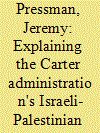

|
|
|
|
|
| Publication |
2013.
|
| Summary/Abstract |
This article challenges critics of the Camp David accords who acknowledge only limited accomplishments or contend the United States was covering for Israeli settlement expansion while seeking to thwart Palestinian self-determination. President Jimmy Carter and his administration sought to create a new pathway toward peace given the unwillingness of Israel's right-wing government under Menachem Begin to support Israeli withdrawal from the West Bank and Palestinian statehood. Carter officials saw the U.S. ideas as a middle way that might get the ball rolling and open a door to peace, however partial and however tentative the process might be at the beginning. Their best-case scenario was that the new U.S. approach would start to transform what the parties thought was possible with regard to the Palestinian question
|
|
|
|
|
|
|
|
|
|
|
|
|
|
|
|
| 5 |
ID:
175715


|
|
|
|
|
| Summary/Abstract |
In 2014 and then again in 2015-16 in Jerusalem, some Palestinians attacked Israelis and others, including through stabbings and vehicular attacks. A case study of Israeli rule of Palestinians in Jerusalem highlights the causal role of horizontal inequality or inter-group disparities in cultural, economic, political, and social realms. Palestinians are shortchanged in each realm, and this helps fuel the violence in the city. The case also adds further nuance to some of the supporting arguments put forward by scholars in the horizontal inequality tradition. Miodownik & Nir’s focus on perceptions suggests the possibility of a gap between reality and perceptions, but in East Jerusalem, Israeli policy and Palestinian perceptions appear in synch. The spontaneous grassroots violence with only limited organizational support contrasts with other cases where violence was the result of the interaction between elites influenced by political inequality and masses motivated by economic inequality. Lastly, Stewart’s policy recommendation of more aid to reduce economic inequality assumes that the rulers will provide more aid or allow others to do so. In East Jerusalem, Israel has not provided sufficient resources but also has blocked the most likely substitute, the Palestinian Authority, from freely operating in East Jerusalem.
|
|
|
|
|
|
|
|
|
|
|
|
|
|
|
|
| 6 |
ID:
075010
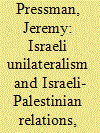

|
|
|
|
|
| Publication |
2006.
|
| Summary/Abstract |
Israeli-Palestinian relations witnessed dramatic changes from 2001-2006. Sharon came to power, the second intifada (uprising) raged, Arafat died, Israel withdrew from Gaza, and Sharon fell ill and out of political life. Israel's embrace of unilateralism led to the Gaza disengagement and the construction of a barrier in the West Bank. Why did Israel embrace unilateralism? Israel's unilateral approach to the Palestinian question resulted from the failure of three other approaches to addressing the conflict: bilateral diplomacy, Greater Israel and settlements, and military suppression. Unilateralism was not inevitable, but Israelis and Palestinians missed opportunities to pursue other pathways. The United States also missed chances to jump-start bilateral diplomacy. The United States role in these years was less consistent and less pro-active than under the first President Bush and President Clinton.
|
|
|
|
|
|
|
|
|
|
|
|
|
|
|
|
| 7 |
ID:
079576


|
|
|
|
|
| Publication |
2007.
|
| Summary/Abstract |
Why did Israeli-Syrian negotiations (1991-2000) fail to lead to a peace treaty? They came very close, but Syria insisted on an Israeli withdrawal from the Golan Heights to the 1967 line. At crucial talks in January 2000, Israel's prime minister decided against a deal with Syria because polls suggested a minority of Israelis supported a withdrawal to that line. His hesitance ruined the chances of an agreement in January and shaped the failed meeting in March 2000 between the U.S. and Syrian presidents. These negotiations suggest four lessons about mediation and negotiation: the hazards and benefits of a biased mediator; structural variables alone do not determine the outcome of negotiations; diplomatic ambiguity can be a destructive factor when the parties turn to implementation; and efforts to convince one's own constituents of the need for compromise are necessary though they may conflict with one's bargaining strategies. This article intensively focuses on the negotiating process and highlights the procedural decisions, substantive issues, and missed opportunities.
|
|
|
|
|
|
|
|
|
|
|
|
|
|
|
|
| 8 |
ID:
087297
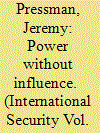

|
|
|
|
|
| Publication |
2009.
|
| Summary/Abstract |
The administration of President George W. Bush was deeply involved in the Middle East, but its efforts did not advance U.S. national security. In the realms of counterterrorism, democracy promotion, and nonconventional proliferation, the Bush administration failed to achieve its objectives. Although the United States did not suffer a second direct attack after September 11, 2001, the terrorism situation worsened as many other countries came under attack and a new generation of terrorists trained in Iraq. Large regional powers such as Egypt and Saudi Arabia did not become more democratic, with no new leaders subject to popular mandate. The model used in Iraq of democratization by military force is risky, costly, and not replicable. Bush's policy exacerbated the problem of nuclear proliferation, expending tremendous resources on a nonexistent program in Iraq while bolstering Iran's geopolitical position. The administration failed because it relied too heavily on military force and too little on diplomacy, disregarded empiricism, and did not address long-standing policy contradictions. The case of the Bush administration makes clear that material power does not automatically translate into international influence.
|
|
|
|
|
|
|
|
|
|
|
|
|
|
|
|
| 9 |
ID:
078653


|
|
|
|
|
| Publication |
2007.
|
| Summary/Abstract |
Many offensive strategies that the United States currently relies on, such as sanctions or deterrence, that might be successful against national terrorist organizations are not as useful against transnational terrorists. They could actually make the problem worse.
|
|
|
|
|
|
|
|
|
|
|
|
|
|
|
|
| 10 |
ID:
179180


|
|
|
|
|
| Summary/Abstract |
After four harmonious years of US-Israeli relations, during which the Trump administration was closely aligned with the Israeli government led by Prime Minister Benjamin Netanyahu, the US-Israeli relationship is bound to come under strain during the next four years of Joe Biden’s presidency. Although President Biden himself has always been a strong supporter of Israel since his early days in the US Senate, his administration’s policies and preferences will almost certainly differ substantially from those favored by the Israeli government—whether it is led by Netanyahu or Naftali Bennett (who is farther to the right than Netanyahu).
|
|
|
|
|
|
|
|
|
|
|
|
|
|
|
|
| 11 |
ID:
156552
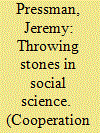

|
|
|
|
|
| Summary/Abstract |
Social scientists treat stone-throwing as a non-violent act or argue that protest movements may be primarily non-violent despite stone-throwing. However, this study of an iconic example, the first intifada (Palestinian uprising, 1987–1993), demonstrates that stone-throwing is better characterized as unarmed violence. Definitions of violence underscore that throwing rocks is a violent act. Moreover, informed observers and data collected on stone-induced injuries during four years of the intifada illustrate the bodily harm caused by stones. The throwing of stones was central to the intifada and its identity and definition. Stone-throwing was the most visible tactic Palestinians used in the first intifada. Lastly, most scholars emphasize the protestors’ perceptions when it might be that the targets’ perceptions matter more for understanding definitions of (non-)violence and subsequent policy changes. These findings challenge important social science work and the mainstream Israeli and Palestinian narratives about the first intifada.
|
|
|
|
|
|
|
|
|
|
|
|
|
|
|
|
|
|
|
|
|